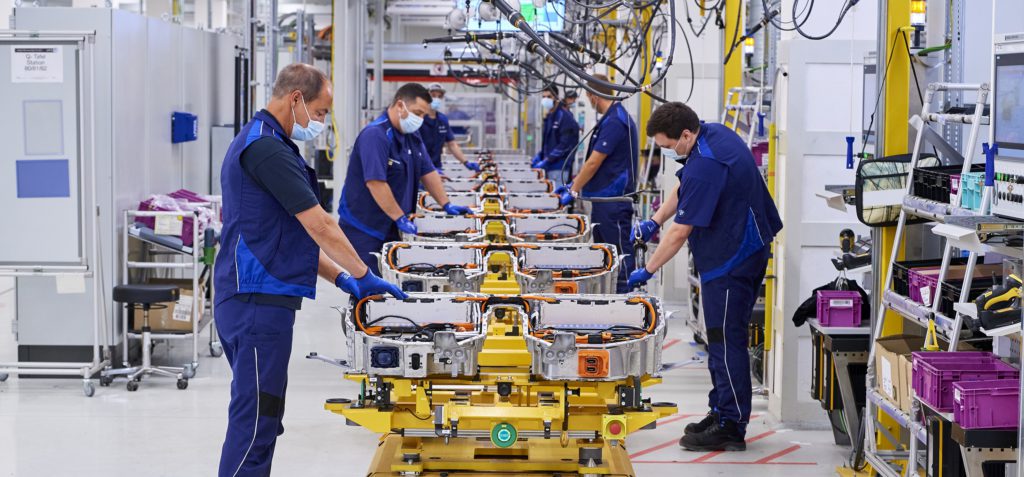BMW and Toyota see returns on electric investments
08 July 2020

7 July 2020
As CO2 emission targets loom large and green incentive schemes are revealed, prospects of an automotive coronavirus (COVID-19) recovery look to be electrified. With manufacturers taking up the electric vehicle (EV) gauntlet, signs of changes in the marketplace are already drawing attention.
As BMW steps up electrification, increasing its production capabilities, it also reports growing demand for its electric vehicles (EVs). With a longer electrified legacy, Toyota is also seeing more customers opt for hybrid models.
Development at Dingolfing
BMW has opened a competence centre for e-drive production at its Dingolfing manufacturing site, where it has produced electric powertrain components since 2013. It is here the carmaker will develop parts such as battery modules, high-voltage batteries and motors across eight production lines. In the coming years, four more lines will be added, increasing the location’s capacity.
The fifth-generation e-drive will also be manufactured at the plant. This unit will integrate the electric motor, transmission and power electronics in a central housing, without using rare earth materials. The unit will be used for the first time in the new BMW iX3, which will go into production in China in late summer. The drivetrain will be compatible across concepts, power levels and models thanks to its modular design.
′We continue to ramp up electromobility and set standards for the transformation of our industry. By 2022, in Dingolfing alone, we will be able to produce e-drives for more than half a million electrified vehicles per year,’ Oliver Zipse, chairman of the board of management of BMW said at the centre’s inauguration.
BMW Group plans to power a quarter of its vehicles sold in Europe with an electric drivetrain by 2021, a third in 2025, and half in 2030. By 2023, the manufacturing group hopes to offer its customers no fewer than 25 electrified models, with roughly half powered by electricity alone.
Responding to demand
′We are following the development of global demand very closely and continue to plan for various scenarios so we can respond quickly as regions around the globe recover from the coronavirus pandemic at different speeds,’ said Pieter Nota, member of the board of management of BMW, responsible for customer, brands and sales.
BMW Group’s sales figures were down 23% in the first six months of 2020 to 962,575 units. A total of 842,153 (down 21.7%) BMW vehicles were delivered in the recorded period, and the Mini brand sold 118,862 (down 31.1%) vehicles. Rolls-Royce reported sales of 1,560 (down 37.6%) units as well. However, the carmaker might take some relief from the performance of its electric line-up.
′Demand for our electrified vehicles also outperformed the market trend in the first half of the year. Our wide range of plug-in hybrid models and the new fully-electric Mini are in high demand among our customers,’ Nota added.
Provisional figures show a combined 8,587 units (up 4.1%) of the Mini Countryman Cooper SE ALL4 PHEV, and the fully-electric MINI Cooper SE were sold in the first half of the year. A total of 61,652 (up 3.4%) electrified BMW and Mini vehicles were handed over to customers in the same period.
Toyota’s new architecture
At the start of July, Toyota kicked off production of the latest generation of the Yaris at its Valenciennes plant in Northern France. This will be the fourth-generation of the carmaker’s best-selling model in Europe. However, this new iteration will be the first small car built on the Toyota New Global Architecture (TNGA) modular platform.
The carmaker claims this will provide the foundation for ′enhanced dynamic performance, improved ride, handling and safety’. The Yaris’s latest hybrid system looks to offer longer electric-driving capabilities, and over 20% improvement in CO2 emissions and fuel economy compared to the previous generation.
An additional €300 million has been pumped into the Valenciennes plant to enable TNGA-based production, which is equivalent to half the amount originally invested in the site. All shop floors have been modernised with new equipment and technologies for improved ergonomics and performance.
UK opens up to hybrids
As UK showrooms opened reopened after the COVID-19 lockdown, the Society of Motor Manufacturers and Traders (SMMT) pointed to a ′tentative restart‘ with a market decline of 35% last month. However, Toyota and Lexus were among a small handful of carmakers who saw an increase in sales and market share, compared with June 2019.
Toyota sold 11,638 new cars, marking a 2.7% increase, giving it an 8% market share. Lexus recorded 1,361 sales, a rise of 13.6% and a 0.94 % market share. The carmaker points to hybrids as the drivers of volume. To date this year, hybrid models have accounted for 63.7% of Toyota new-car sales and 99.7% of Lexus sales in the UK.
′The sales results for June are a fitting reward for the tremendous efforts our Toyota and Lexus retailers have made during the past weeks to resume trading in a way that is safe and gives customers complete peace of mind,’ said Paul Van der Burgh, Toyota (GB) president and managing director.
′Their commitment and the compelling quality of our growing range of self-charging hybrids have combined to deliver the perfect foundation for further growth in the months ahead. More than ever, consumers want to be sure they are making the right choice, and they are increasingly putting their faith in our hybrids.’